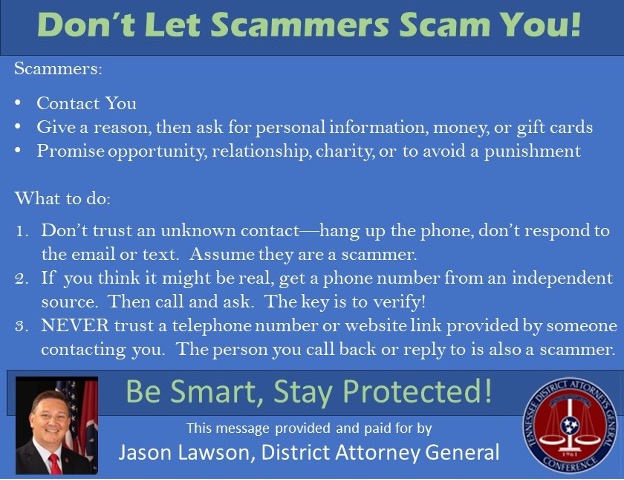In a joint effort with the Wilson County Sheriff’s Department SCAN (Senior Citizens Awareness Network), today District Attorney General Jason Lawson announced a new initiative to help protect seniors and other members of the public from the most rapidly growing crime in the criminal justice system. Financial scams target people, mostly seniors, requesting that they share personal information or even send money to someone who ultimately turns out to be nothing more than a thief. The request to share the information or send the money is often induced by false promises of financial gain, assistance to another person, or even with false promises of romance. Some of these scams can be a lengthy exercise, involving several telephone calls and even time spent through telephone or electronic communication grooming the victim until the request to share the information or money is made. In the end, however, the victim learns that the scammer has misused their information to open new lines of credit in their names and any money sent by the victim is never recovered.
As an effort to help the people of our community, Wilson County SCAN and the District Attorney of the Fifteenth Judicial District are partnering to engage in a public awareness campaign to educate individuals on when to be concerned that the request might be a scam. The public awareness campaign will include information distributed through newspaper articles, on social media, and a radio discussion. In addition, the cooperative agencies will be distributing refrigerator magnets to help provide a more lasting resource on when a request may be a scam. The refrigerator magnets contain the print “Be a scammer stopper. Scammers often ask for: (1) Money or gift cards (2) A credit card number (3) Personal information (4) A deposit for a prize you’ve won. Never send money or personal information in response to a call, text, or email. If you think you’ve been a victim of a scam, call your local sheriff’s office today.” Any person wishing to receive a refrigerator magnet for themselves or a loved one may contact the Wilson County Sheriff’s Office SCAN division at 615-444-1412 ext. 499 or the District Attorney’s Office at 615-443-2863 between the hours of 8:00 a.m. and 4:30 p.m.
According to the National Council on Aging, financial scams targeting older adults are costly, widespread, and on the rise. In 2021, the Federal Bureau of Investigation reported that in that year alone there were 92,371 older victims who were victims of fraud resulting in $1.7 billion in losses. This constituted a 74% increase in losses compared to 2020. While older Americans are not the only victims of financial theft, they do constitute a large percentage. Older Americans often have a savings balance greater than younger Americans and are more likely to take a risk that ultimately proves costly.
“Earlier this year, I had a gentleman in our district who received a text message that the sender claimed was accidentally sent to the victim. The text message referenced a hot tip on a cryptocurrency exchange. As the conversation progressed, the sender even invited the victim to conduct his own independent research on the company using Internet search engines of the victim’s choosing. However, once the victim chose to invest, his error was that he did so through a website link that was supplied via text message to the victim by the scammer. That website link proved to be a false website, and once the investment was made, that false website was taken down immediately. The real company, the legitimate company, never saw a red cent of the intended investment. That money ended up in the pocket of a scammer, solely because the investor trusted a link sent via text. These are the types of sophisticated scams that are now being utilized to steal,” said Jason Lawson, District Attorney.
It is important to share stories such as this to prevent others from falling prey to these same types of scams.
Other common scams seen recently are text messages alerting people that their bankcard has been turned off or telling the victim that a subscription has been approved. The victim will call the number to try to determine what is going on, since they did not subscribe to anything or have no reason why their bankcard would be turned off. Once on the phone, a fake customer service representative will ask for the bank account or card number to locate the subscription. They may even tell the victim that the subscription is in error and is cancelled now. But it is too late. The information that the scammer was after has now been provided to them.
“The most important weapon in fighting scams is for people to understand that they should never give out their personal information or financial information when someone contacts them seeking it. If a person is concerned about something they have received, they should conduct their own research to find a telephone number for the company. They should call the company directly, at a telephone number that was not provided to them by a text or email. Never trust a telephone number, a text link, or an email link provided to you by an unknown person. And count on the fact that any money sent will be lost with no gain in return, either personal or financial. The old saying ‘better safe than sorry’ absolutely applies,” said DA Lawson.
Any person who is a victim of a scam may make a report to their local sheriff’s department. As many of these scams originate from outside of Tennessee or even outside of the United States, the Federal Bureau of Investigation has created an on-line report system to assist local law enforcement and victims in efforts to investigate scams.

Linda Johnson (left) and Linda McDonald (center) receive ScamStop magnets from DA Office Secretary Linda Hensley (right).


